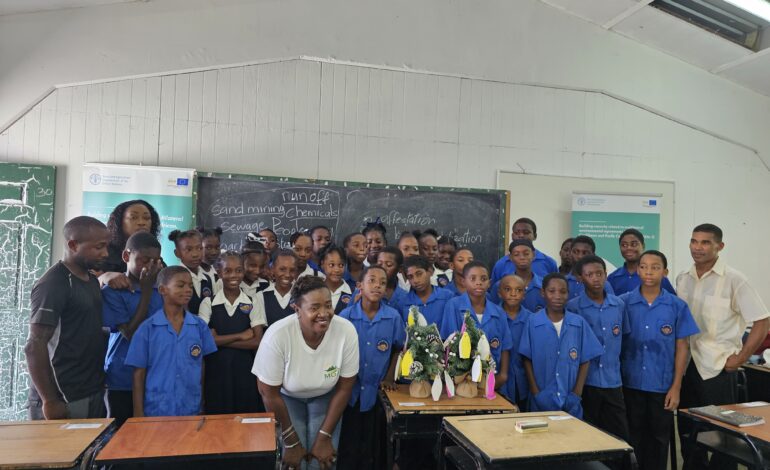
Over 30 young students were taught the value and importance of preserving a local river for a better life
The Food and Agriculture Organization of the United Nations (FAO) took decisive steps to guide children and young people of Saint Lucia towards a better environment and consequently a better life. The organization’s recent partnership with the Saint Lucia Division of Forests and Land Resources Development to teach Grade 5 and 6 students of the Anse La Raye Primary School about the importance of the Anse La Raye River, clearly demonstrated their commitment to empowering the younger generation.
An estimated 30 students were taught about the value of safeguarding the river, which flows past their school, through drawing, reading, conversation, and games. The hydrological cycle was explained and the linkages between the river and the community were highlighted using interactive technologies and engaging workshops. At the end of the sessions, the pupils were able to describe how the river benefits their district and the people who live there, identify practices that are bad for the river and provide examples of actions they could take to conserve the river system and keep it healthy.
Under the direction of the Division of Forestry, the students also planted 25 fruit and forest trees along the school’s border to demonstrate their dedication to preserving their river. Ten year old, Trevor Cornelle was one of the students who participated in the tree-planting initiative. He said, “I enjoyed the tree planting exercise because I learned some important agricultural skills like how to prepare the land, how to dig holes to plant trees, and how to plant the trees well. The planting activity was extremely exciting. We planted many types of trees like cinnamon, nutmeg, and avocado. The fruit-bearing trees will help us fight soil erosion and will complement our school feeding programme in the next few years.”
Ms. Charmain Augustin, Forest Officer, explained the importance of this activity for the Anse La Raye community. She stated, “Anse La Raye is an area that is historically prone to flooding. The trees the children planted will help reduce the risk of flooding. They will also help reduce future storm runoff, erosion, and pollution of the waterway. We must continue planting more trees, to contribute to global reforestation efforts, mitigate climate change, repair damaged ecosystems, and restore lost forests.”
Meanwhile, Principal of the Anse La Raye Primary School, Mr. Flavian Isembert, voiced his support for the activity, indicating that, “The tree planting exercise was a great co-curricular activity for Grade 5 and 6 students at the Anse La Raye Primary School. To prepare students for the tree planting exercise, pupils learnt about the consequences of water pollution, practices that can combat water pollution, the consequences of deforestation, and steps that can be taken to protect our forest and water supply. As custodians of the environment, they pledge to play an active role in fighting deforestation and water pollution.”
The activity at the Anse La Raye Primary School was part of the implementation of the Programme for Capacity Building related to Multilateral Environmental Agreements in ACP Countries Phase III (ACP MEAs 3), and funded by the European Union. Community-based participatory techniques are a crucial component of the three forestry activities in the ACP MEAs, according to Dr. Therese Yarde, ACP MEAs 3 Caribbean Regional Project Coordinator. “Through activities like this one, kids learned about the need of protecting biodiversity and ecosystem services in their communities while also having fun. Children and young people have the key to the future. The choices made today to protect the environment that they will unavoidably inherit will determine the quality of their life”, she said.
Leshan Monrose, National ACP MEAs 3 Coordinator, stated that for young persons living in a Small Island Developing State like Saint Lucia, their future might appear uncertain as the island, like so many others, sits at the forefront of climate change environmental emergencies. She added that every year SIDS faces threats from droughts, hurricanes, flooding, storm surges, and other weather-related which impact biodiversity, food and nutrition security, and livelihoods. Additionally, poor internal practices such as deforestation, inadequate land use planning, harmful agricultural practices, and pollution compound these issues.
The work of the ACP MEAs 3 project is not only timely but also critical to the environment. Under the project, FAO and the Division of Forestry are working closely with community groups to revegetate the riparian zones of the Anse La Raye, Canaries, and Cul De Sac rivers by planting and maintaining fruit trees, forest trees, and vetiver grass. So far, more than 5,000 seedlings were been planted. The forthcoming academic year will see increased engagement to schools in the recipient areas.





